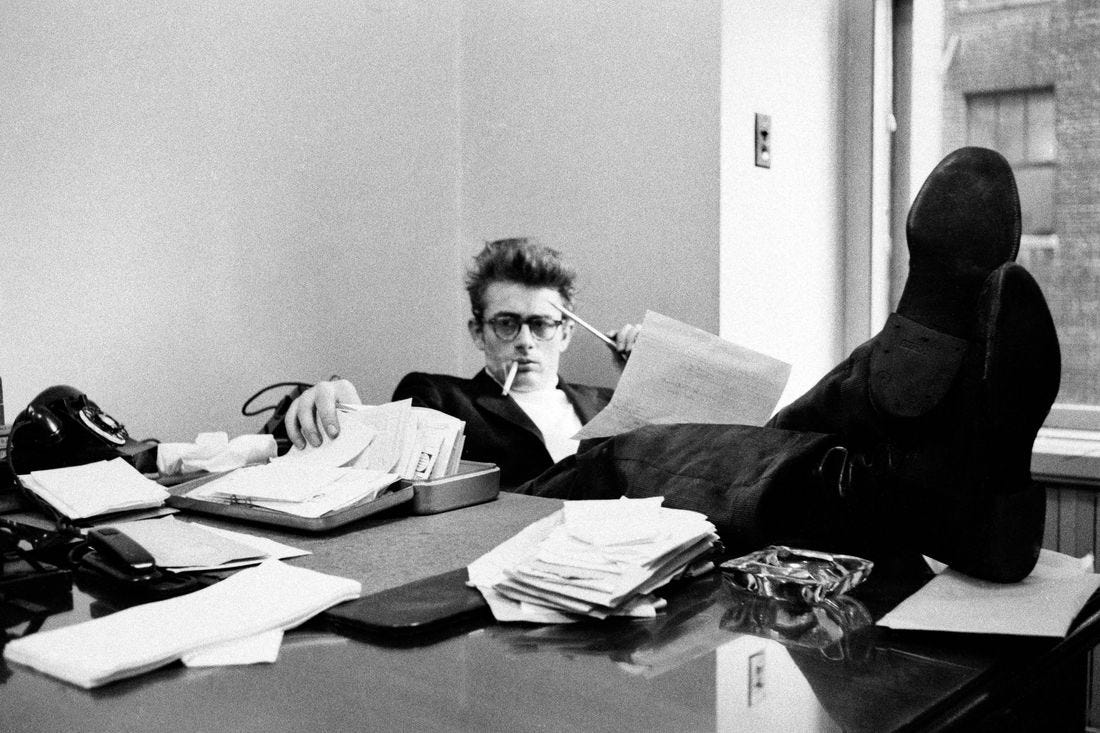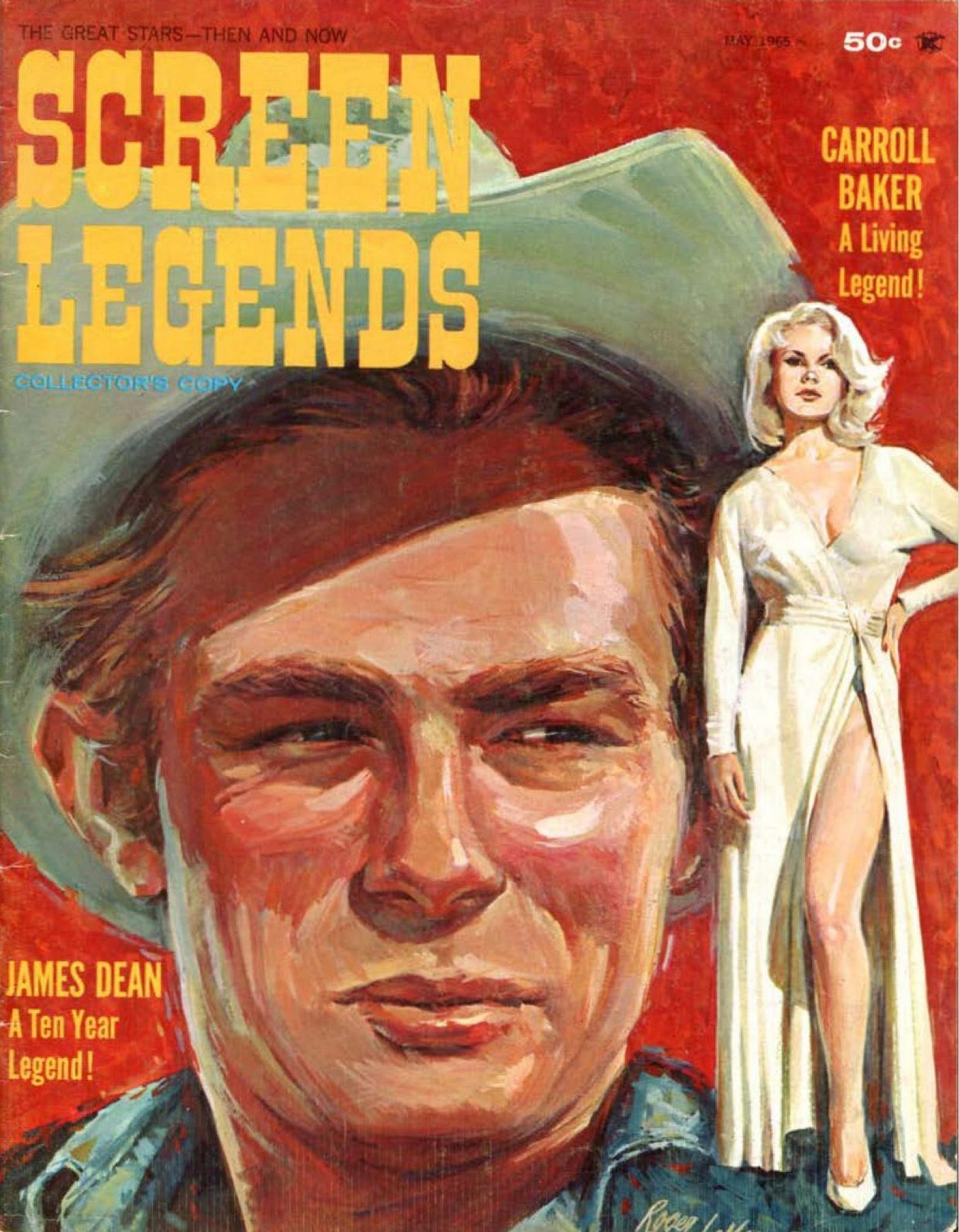Dissecting a Franken-Quote
A famous quotation turns out to be a Frankenstein's monster of sewn together parts.
The epigraph to the late John Howlett’s 1974 biography of James Dean takes the form of a lengthy quotation ascribed to its subject. Indeed, if authentic, it would be just about the longest string of unscripted words recorded from Dean in his entire life. But there is a set of ellipses in the middle that gave me pause:
An actor must interpret life, and in order to do so must be willing to accept all the experiences life has to offer. In fact, he must seek out more of life than life puts at his feet. In the short span of his lifetime, an actor must learn all there is to know, experience all there is to experience, or approach that state as closely as possible. He must be superhuman in his efforts to store away in the core of his subconscious everything that he might be called upon to use in the expression of his art. Nothing should be more important to the artist than life and the living of it, not even the ego. To grasp the full significance of life is the actor’s duty; to interpret it his problem; and to express it his dedication… Being an actor is the loneliest thing in the world. You’re all alone with your concentration and imagination, and that’s all you have. Being an actor isn’t easy. Being a man is even harder. I want to be both before I’m done.
The quotation is a popular one. Martin Sheen and Emilio Estevez used part of it in their joint memoir. A biographer of Johnny Depp quoted it to compare Dean to his subject. It appears, in some form or another, in later Dean biographies and encyclopedias, including the James Dean Estate’s authorized biography and on its website, with a bewildering array of citations, or no citation at all.
For my own book, I wanted to use this quotation, but I had difficulty tracing the source. Initially, I wanted to know what the ellipses concealed. Unfortunately, no question I ask ever turns out to be simple. The resulting adventure took me a complex week of archival research to untangle. Along the way, I learned that I was the first person to be curious enough to trace back the quotation since 1974. I figure I ought to publish the results of my investigation to save the next person the trouble, if Substack still exists in in 2072.
The first thing I discovered is that the ellipses are not omitting text but instead are hiding the fact that the two parts of the quotation are unrelated. Indeed, even that isn’t quite accurate. But let’s start with the first and longest part.
The words are, in all likelihood, not those of James Dean. According to David Shipman, the biographer of Marlon Brando, the words are actually Brando’s, from a 1960 interview. They are quoted in Shipman’s 1974 biography, Brando, though Shipman provides no further citation. His bibliography is simply a jumble of magazine names with no articles or authors cited, and even after discounting the magazines whose runs are searchable online, I don’t have the energy to hunt down the rest to try to find the Brando interview. On the other hand, Gene Ringgold, writing in Screen Facts in 1964, is the oldest source I can find attributing the words to Dean. Ringgold, too, fails to provide any citation. Although Ringgold’s text is older than Shipman’s, it’s evident that Shipman had an actual printed text in front of him since he is the only author to provide a specific date. Also, it sounds more like Brando, who could string a sentence together better than Dean. I can only guess how Ringgold mixed them up—probably from the old, pre-internet practice of clipping quotes and saving them in a scrapbook rather than consulting whole articles—but when his essay was reprinted in Screen Legends no. 1 in 1965, it became the source for all later writers attributing the words to Dean rather than Brando.
The second half Howlett’s epigraph is the more interesting, and more difficult to trace. I’ll save you the lengthy investigation I had to go through, reading dozens of versions of the text and placing them on a timeline to follow permutations over time. Suffice it to say that I discovered that Howlett had run together two unrelated quotations.
The first was easy enough to find. “Being an actor is the loneliest thing in the world. You’re all alone with your concentration and imagination, and that’s all you have.” That line is close enough to the original source that it’s recognizable as a condensed and slightly altered version of a statement Dean made to Seventeen magazine in 1955:
“Being an actor,” he phrases his words slowly, “is the loneliest thing in the world. The stage is like a religion; you dedicate yourself to it, and suddenly you find that you don’t have time to see friends and it’s hard for them to understand. You don’t see anybody. You’re all alone with your concentration and your imagination, and that’s all you have. You’re an actor.” (Seventeen, Oct. 1955, p. 120)
As with every quotation, copyists have presented it in a fantastical array of permutations. Even more careful biographers, like the late Donald Spoto, misrepresent it. Spoto, bizarrely, claimed Dean said in late 1953 or early 1954 in New York while feeling depressed rather than when and where he actually did, in Los Angeles in the summer of 1955 to promote Rebel without a Cause. It’s an odd choice since, even if the original Seventeen piece wasn’t accessible to most readers when he wrote in the 1990s, it was quoted at length in David Dalton’s biography of James Dean.
The final part of Howlett’s quotation gave me immense trouble because it simply does not show up anywhere prior to Howlett, and I thought he made it up. It turns out that, just as he had done with the prior sentences, he was either a sloppy or deceptive copyist and didn’t get the wording right. I will spare you the hundreds of pages of material I had to sift through to find it, but I discovered the oldest extant version of the quotation. It appears in a magazine called The Moderator, run by and for undergraduate and graduate students in the 1960s. The magazine’s most famous writer was probably Roger Ebert, who was a regular contributor during his college years. The quote, however, came from Glenn McCurdy, then a local newspaper editor in Connecticut, in his article “James Dean and the Activists,” on page 16 of the February 1965 issue of The Moderator: “‘Being a good actor isn’t easy,’ he said in his Indiana twang, ‘and being a man is even harder. I want to be both ... and I will before I’m done.’”
Now, 1965 is a long time out from Dean’s death in 1955, so I wondered where McCurdy got this quote from, since he provides no clear sourcing. Could it have been from an earlier magazine interview I hadn’t read? For that answer, we need to fast-forward all the way to 2017, when McCurdy auctioned off his research materials, which included James Dean’s high school yearbooks. According to a letter from McCurdy provided in the auction catalog, McCurdy traveled to Dean’s hometown of Fairmount, Ind., met with Dean’s family, who gave him the yearbooks, and spoke with Dean’s friends for a series of articles he wrote about Dean. The quotation, such as it is, comes from someone who knew Dean and spoke directly to McCurdy, paraphrasing a high school sentiment Dean reportedly said around 1949.
So, in the end, the line about being a man is not really the most authentic of quotations, and is most likely a paraphrase at best, but it does have at least some provenance.
Howlett’s strung-together Frankenstein of a quotation, though, is fabricated, garbled garbage. That no one checked the sources between 1974 and today is all you need to know about the accuracy and rigor of the celebrity biography genre.




Great read, thank you!
Well done, Jason…I rarely miss yer weekend musings and ‘Cut to the chase’ searches for that buried kernel of rational thought…and more importantly, Truth…
Cheers,
Billy…